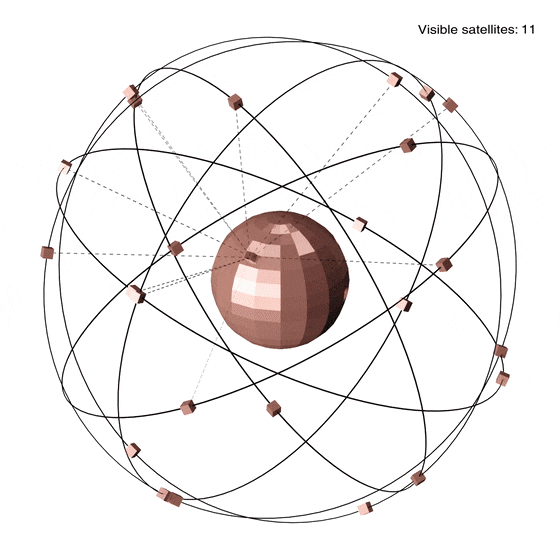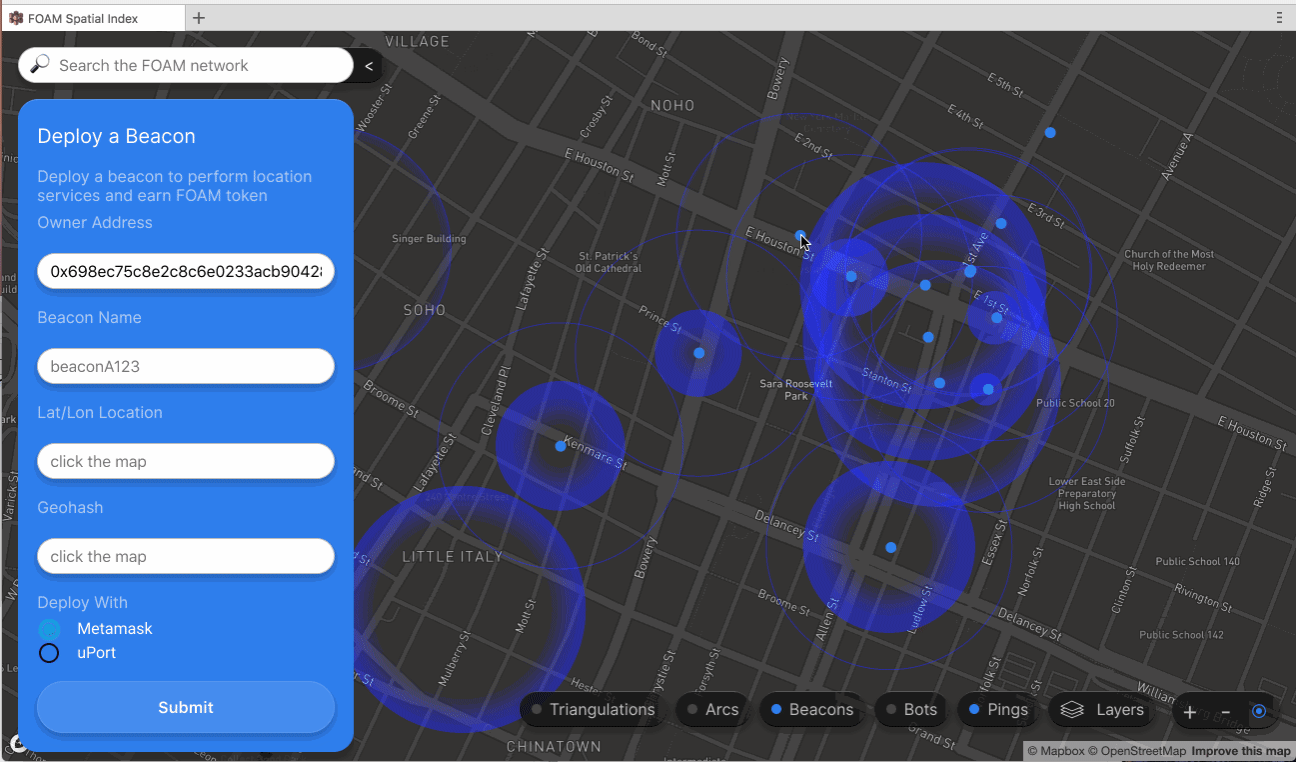
FOAM is a startup on Ethereum that is comprised of three elements:, Crypto Spatial Coordinates (CSCs), the Proof of Location Protocol, and The Spatial Index. Each of these elements work together to provide Ethereum users with a greater ability to interoperate with the physical world.
I wrote about FOAM last year, and since that time, the team has been focused on working every possible angle to ensure the cryptoeconomics of FOAM are just right. Because of the hard work in a pre-release environment, some of the details of my earlier posts will be incorrect...although the big picture stuff, and the ideation of use cases, should still be possible.
This post will focus on these three main elements, and how they interact. Those interested in further details, including the software development side of it, should check out the FOAM Medium blog posts by CEO Ryan J King.
Crypto Spatial Coordinates
The first element is the Crypto Spatial Coordinate. A CSC is created by encoding an Ethereum address with a geohash.
A geohash is a method of showing a location using a string of numbers and letters. For instance, most people are familiar with latitude and longitude coordinates: 50.129 degrees east, -110.301 degrees north shows us how far east and north something is from the Prime Meridian and Equator. These coordinates are used by GPS devices and map programs such as Google Maps.
The geohash differs in that it looks like a random string of letters and numbers (a bit like what recommended “good passwords” should look like). The geohash has some similarity to lat/long coordinate system: the longer it is, the more precise it is, and two locations that are near one another will share many characters, with the least significant digits near the end.
Example
Times Square is 40.758895, -73.9873197 using lat/long coordinates. A hot dog stand on one end of Times Square might have slightly more precise coordinates than one on the other end of Times Square:

The more significant digits in the latitude coordinate remain the same, until the least significant digit, which represents the smallest difference, where we see a change from 9 to 3.
The geohash of Times Square is dr5ru7k. In the case of our hot dog stands, we might see:

Once again, the least significant digit is changed, while the rest remain the same.
CSCs take a geohash and an Ethereum address, then apply some mathematical processes to them, and create a unique identifier for each location that allows it to be interacted with on the Ethereum blockchain.
CSCs will also have the option of being tied to radio beacons, which will provide location validation services. Users can stake FOAM Tokens (FT) in these CSCs, which will create incentives for honest reporting to maximize returns.
In order to expand the capabilities of CSCs, we’re going to use the Proof of Location Protocol and the Spatial Index. Let’s continue to these…
Proof of Location Protocol
The Proof of Location Protocol is the core project of FOAM: a trustless, independent, open, accountable and incentivized protocol that will secure the location data in a way that is not possible with GPS.
To understand why Proof of Location needs a “protocol”, we need to look at the current location system used by devices today: GPS. GPS positioning is a receive only function on devices, which calculate the distance from at least 3 satellites (due to clock signal delays) in orbit around the earth.

GPS is incredibly easy to spoof, as witnessed by a quick Google search. This was especially abused by Pokemon Go players to reach hard to find Pokemon not generally in their geographical area. Cheaters were punished, if caught, but it’s pretty obvious that if incentives as trivial as video game monster collection will cause cheating, implementing blockchains into location finding will be a huge target.
The Proof of Location Protocol is designed to incentivize honest reporters of location data. Just as Bitcoin’s Proof of Work Protocol solved the Byzantine General problem for securing a ledger across untrusted random actors, FOAM’s Proof of Location Protocol is designed to secure location reporting from untrusted random actors. In other words, if the incentives align for people to report honestly (ie, they make more money being honest, and lose money for lying), one needs only to trust the protocol, and then implicitly trusts each radio beacon en masse...rather than having to trust each single one in particular. To compare it to Bitcoin again, we never think about whether we can trust one particular mining rig, as each is running the Bitcoin program, which is tested 24/7.
This protocol also incentivizes people to report more by placing more radio beacons to do more reporting. According to a [recent podcast on Epicenter], beacons placed in areas where they are the only beacon will mine FOAM tokens, creating the incentive for people to cover as many square miles as possible. For FOAM to work properly, as a base layer of authentication services, the tech needs to be ubiquitous. The Proof of Location Protocol will help make that a reality.
The Spatial Index
The Spatial Index is a “general purpose visual blockchain explorer” in which one can discover where CSCs are placed and active on a map. Described as the cross between Google Maps and a Bloomberg Terminal, the Spatial Index allows users to visualize the information that is being presented by FOAM.

The Spatial Index is much more than a graphical user interface for CSCs, however. In the long run, the Spatial Index will allow third party developers the ability to hook into the FOAM ecosystem and develop their own applications and uses on top of it. Imagine-the next Pokemon Go sensation could be run on the Ethereum blockchain, using the Spatial Index as a backend for trustless information. You could collect rare Cryptokitties by visiting certain locations (coffee shops, pay attention!). A secure location system could also work as the backbone for a fleet of driverless cars. Since the Proof of Location Protocol and the Spatial Index are open sourced, anyone can develop on top of them, without having to ask permission.
Both enterprises and solo developers will be able to develop decentralized applications-dapps-on top of the FOAM ecosystem. This is the power of open development-FOAM creates the incentive system (Proof of Location Protocol) that promotes the placement of millions of radio beacons, and entrepreneurs find ways to utilize this in dapps that will make life better for people around the world.
The Vision
FOAM’s vision is to be the provider of location information for the blockchain, and we not only get to watch it happen in real time, but we can be a part of it as well. You can join them on Reddit or Telegram and find out how to get involved, which includes a lot more community involvement than most blockchain projects. I also highly recommend listening to FOAM’s CEO, Ryan King, talk on Epicenter about his vision, as they ask a lot of deep questions that will help you better understand this revolutionary project.
Also, if you want to read more about FOAM, you can check out the four articles I wrote in 2017, located on my website. Questions? Ask below or visit the Telegram channel!
Disclaimer: I am working with FOAM to produce these articles. My opinions remain my own. The above is for information purposes and should not be viewed as investment advice.
-Jeff
Posted from my blog with SteemPress : http://steemmaker.com/threefoamfactors/
Very interesting and pretty amazing. I keep reading about blockchain scalability issues outside of Steemit, though, so how will FOAM, and whatever games/apps that get built on top of it affect the Ethereum blockchain?
I think I might have read it has one of the more versatile blockchains out there but still, this kind of thing has the potential to explode if the Pokémon Go phenomenon and now the CryptoKitties craze are any indication.
I agree with you about places like coffee shops getting in on this, however, businesses need to know, first of all, that these things are even possible and then figure out profitable ways to participate in building them out so they can potentially reap the rewards.
In our area, the majority of the Pokémon stops were in small boutique shops in the older downtown section. I don't think any of them really knew why more people were wandering around with their phones out, so I think they've missed a golden opportunity, since most of the hype has died down.
The gamification is a few years out, but I think tech savvy business owners (or consultants) will jump on the train early and get some free press if they pay attention. "Local Business lures in customers with free cryptocurrency, news at 11!"
Scalability is the make it or break it of the Ethereum blockchain, but the cool thing is that there are a number of current solutions being worked on by multiple teams.
A fleet of driverless cars would be fabulous, until some person finds a way to get themselves killed. Who knows how far behind that accident has pushed back that development.
Do the radio beacons need to be stationary for this to work? The Proof of Location Protocol could be used for other things, if they develope it without a shut-off switch. 🤔
Great question-I don't think they'd have to be, although the CSCs do. I would assume a beacon that you'd have in your car would be the same hardware, and that wouldn't be stationary...
(you hear an engine rev and horn honk)
MEEP! MEEP!
(the window on the humvee rolls down to reveal a warm smiling face)
"Hello! I'm @shadow3scalpel and with the help of my protege, @chairborne, we are actively assisting veterans, retirees and active servicemen and women here on Steemit. We feel it is our 'duty' to support each other. Any questions or comments you may have, simply respond to this comment, thank you!"
(the window rolls up and the engine roars as it drives to the next person on the list)
Comment by @killerwhale. This is a opt-in bot.
I like this blockchain
I appreciate your cryptocurrency news
Thanks @ protegeaa
hi @protegya sir, how are you?
You have touched very interesting topic. thank you